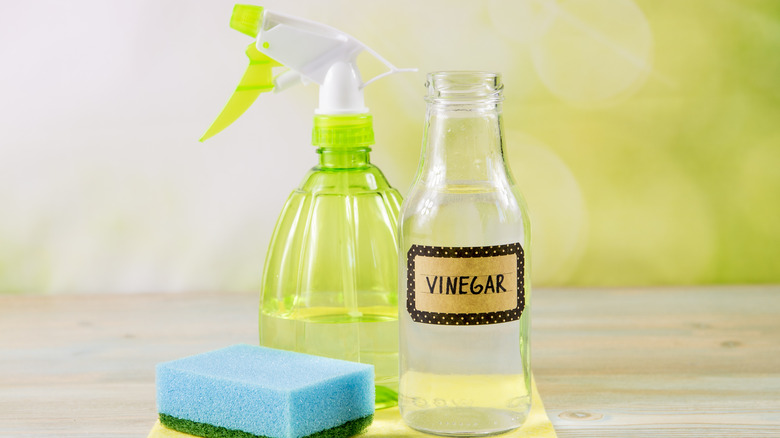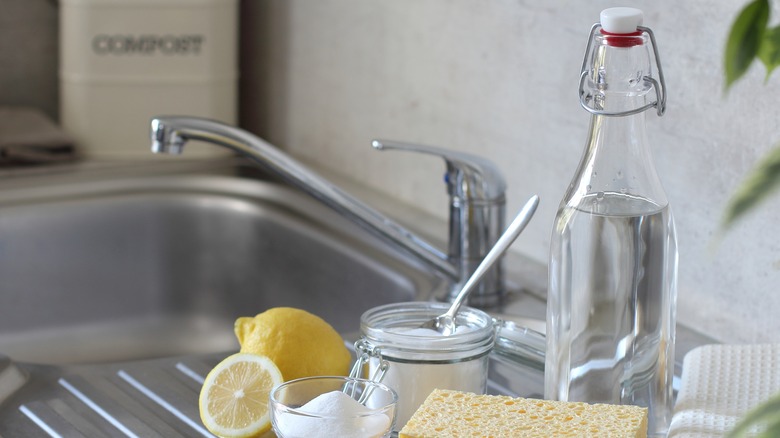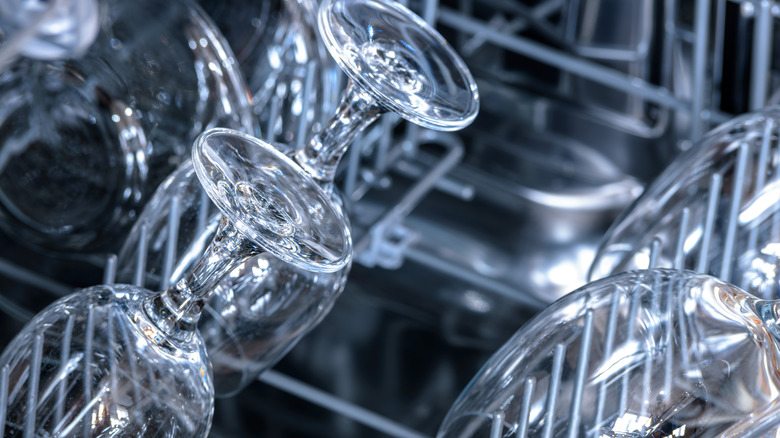Vinegar Is Your Best Shot At Cleansing Cloudy Drinking Glasses
You've run into a dilemma: You just pulled your glasses from the dishwasher, but they're covered in a cloudy film. What causes this cloudiness? According to Maytag, a common reason for cloudy glasses is hard water deposits. The two primary minerals in hard water are calcium and magnesium (per USGS). When these minerals settle on dishes, creating deposits, they form a cloudy coating.
Another common reason for cloudy glasses is etching. Etching generally occurs when soft water creates scratches on glasses. Cloudiness resulting from etching can't be resolved, but there are ways to remedy cloudiness caused by hard water deposits.
Well, your first instinct may be to put the dishes in the dishwasher again, but this will do nothing but expose them to more hard water. According to Good Housekeeping, one of the best products for cleaning cloudy drinking glasses is white vinegar. But why — and how — does it work?
The acid in vinegar dissolves hard water deposits
White vinegar is known for being one of the best all-natural cleaning substances. According to Good Housekeeping, vinegar cleanses cloudy glasses due to its acidity, which is great for dissolving hard water deposits. There are different ways to use this vinegar method, but it's generally recommended that you begin by immersing and soaking the glasses in vinegar. You can do this by simply filling your sink with vinegar and placing the glasses in the sink.
There is some variation across sources regarding how long you should let the glasses soak. However, you should leave the glasses in the vinegar for a minimum of 15 minutes for the best results, per Maytag. After letting the glasses soak, wash them to completely remove the cloudy residue.
There are a couple of ways you can wash the glasses. You can rinse them using warm water only or gently clean them with both dish soap and warm water. Regardless of which washing method you choose, it's important that you dry the glasses with a microfiber cloth, as air drying can cause new water spots.
How to prevent drinking glasses from becoming cloudy
Vinegar is a great way to cleanse cloudy glasses. But how do you prevent them from becoming cloudy in the first place? According to Candy, one of the best preventive measures you can take is using a rinse aid. A rinse aid protects your dishes from water stains and gives them a beautiful shine, ensuring that they always look their best.
Regularly cleaning your dishwasher will also protect your glasses from a cloudy film. Cleaning your dishwasher is a fairly easy process. And as with drinking glasses, you can use white vinegar to clean it. After removing everything from the dishwasher, including the racks and the filter, place a bowl of white vinegar at the bottom of the dishwasher, and run it on a hot water cycle, advises Architectural Digest. The acid from the vinegar will dissolve any food debris that's lodged in the dishwasher.
If you're having trouble with cloudy drinking glasses, just remember that you can use white vinegar to both remove and prevent the cloudiness.


